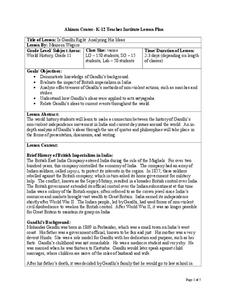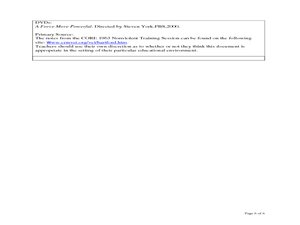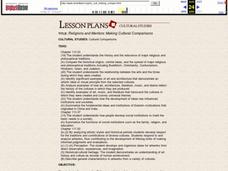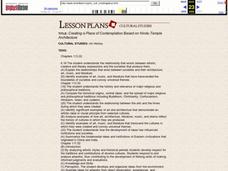Curated OER
Major Religions in Ancient India
Sixth graders explore major religions in ancient India. They compare polytheism, monotheism, and reincarnation. Using the internet, 6th graders research information to compare Hinduism and Buddhism. They create, using Inspiration...
Curated OER
Major Religions in Ancient India
Sixth graders compare and contrast Hinduism and Buddhism. For this ancient India lesson, 6th graders use Inspiration software to create graphic organizers that show the similarities and differences between Hinduism and Buddhism.
Curated OER
India History: The Big Picture
In this India history study guide worksheet, learners read a brief overview pertaining to the history of India from about 1500 to the present.
Curated OER
Hinduism vs. Buddhism
Fourth graders create Venn diagrams showing the differences and similarities between the religions of Hinduism and Buddhism.
Curated OER
Social Studies: Religions and Folktales of India
Students examine the world's major religions, focusing on India as presented in folktales. They take notes while reading the stories and retell them orally. Students research belief systems and write one-paragraph reflections about them.
Curated OER
World Religions: A Look at the Way the World Prays
An introduction to the characteristics of and differences between five world religions (Christianity, Judaism, Islam, Hinduism, and Buddhism), this presentation will help to clarify some of the confusion surrounding the details of each...
Curated OER
DECODING BOROBUDUR
Students study the example of the spread of Buddhism in Southeast Asia, assess the possible meaning conveyed by Borobudur, explore how ideas travel and the process of syncretism, and appreciate how and why Salindra leaders in Java...
Curated OER
UNDERSTANDING KARMA, DHARMA, AND SAMSARA
Students examine the Indian concepts of dharma, karma and samsara, see how violating one's dharma might lead to becoming an out-caste, and appreciate how these concepts undergird Indian life.
Curated OER
Is Gandhi Right: Analyzing His Ideas
Students explore the connection between Gandhi and the Independence Movement in India. In this lesson on social change, students examine the ideas of Gandhi to analyze non violent change. Students consider the impact of British...
Curated OER
The Power of Nonviolent Struggle
Pupils identify how Mohandas Gandhi developed a nonviolent crusade for justice. In this nonviolent protest lesson, students watch segments of a documentary about Gandhi's reaction to imperialism in India. Pupils write essays that require...
Montana State University
One Mountain, Many Cultures
Americans may think of Mount Everest as a region dedicated to adventurous hikers, but many cultures have flourished there! Learners read informative books, watch videos, participate in classroom discussion, analyze folk tales, and...
Curated OER
Applying Ahimsa to Traditional Stories
Investigate the life of Mahatma Gandhi by researching non-violent lifestyles. Learners define the word ahimsa and discuss the personal characteristics that made Gandhi a peaceful warrior. They also create a poster about the story "The...
Curated OER
Looking Toward a Higher Deity
Sixth graders study the tenets of the five major religions of the world. In this religion instructional activity, 6th graders investigate the tenets of Buddhism, Christianity, Hinduism, Islam, and Judaism by researching and recording on...
Curated OER
ON BECOMING A NONVIOLENT WARRIOR
Students examine the concept of non-violent social change. In this lesson on social change, students research and role play to demonstrate ways in which this might be accomplished while making connections to various events in history.
Curated OER
Unit on Gandhi and Ahimsa
Students explore the history of Gandhi and his viewpoint and example of nonviolence. In this World History lesson plan, students complete numerous research assignments and activities over the course of nine lessons to expand their...
Curated OER
Guidelines for Governing: Utopia and The Prince
Students explore the power of the Church in government. In this literature lesson, students read Sir Thomas More's Utopia and Niccolo Machiavelli's The Prince. Students respond to questions regarding the works and discuss them.
Curated OER
Trade and Travel Along the Silk Road
Students examine the religions that developed along the Silk Road. In this compare and contrast lesson, students visit various stations within the classroom to learn about the Silk Road and the two religions that developed. Using a...
Curated OER
The Carter Center’s Work in Sub-Saharan Africa
Students explore the state of Sub-Saharan Africa. In this geography skills lesson, students examine the work of the Carter Center in Africa as they investigate the strengths and weaknesses of linguistic, tribal, and religious diversity.
Curated OER
Religions and Mentors: Making Cultural Comparisons
High schoolers compare the Tirthankara of Jain religious stories and compare it to mentors who appear throughout Western stories. Studentsl create a narrative or a portrait in honor of a mentor of his or her own.
Curated OER
Creating a Place of Contemplation Based on Hindu Temple Architecture
Students study the architecture and decoration of Hindu temples, compare them with, and apply them to, a place of contemplation they will design for themselves.





















